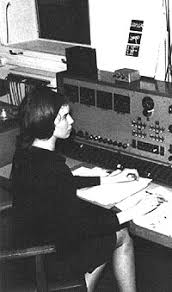Delia Derbyshire – Queen of the BBC Radiophonic workshop
Who is this young lady I hear you ask. Well, if you have heard the theme tune to Dr. Who, then, that was she! A very talented woman and a “thinker outside the box”.
During her primary school years, she could be found teaching her classmates reading, writing and playing tunes on the piano. After Grammar school, she was awarded a scholarship to study maths in electrical engineering at Oxford and Cambridge, but changed after a year or so to study music. She obtained her degree in maths and music in 1959, when she approached Decca Records. They told her that women couldn’t operate tape recorders and didn’t get the job! Decca also turned down the Beatles…See the pattern?
After a year or so teaching and working in the newly set up telecoms sector, she joined the BBC as an assistant studio manager, working on classical music schedules. It was here she heard about the new Radiophonic workshop. The BBC was under pressure to move with the times to create more spectacular sound effects for programs. They de-mothballed some quite outdated equipment, tape machines, mixers, signal generators etc and told this small group to get on with it. In 1962, she worked with a composer Ron Grainer who was asked to write a theme tune for the new Sci-fi series Dr. Who. Delia went away and electronically produced the masterpiece that we all know and love. She did this by creating the main tune using a batch of signal generators, scrapping bass guitar strings, recording the sounds of industrial metal lamp shades being hit with screwdrivers…. All this was recorded on tape machines running at different speeds to create the out-of-the-world feeling. She was known to have loops of tape running up and down the corridors of the studios at BBC’s Maida Vale. Her main challenge was to get the tape recorders to run in synch, so these were modified with variable speed controls so she could manually make tiny changes as required. The result speaks for itself! Grainer, the composer, was so impressed, he wanted Delia to be known as a co composer. But the BBC being what it was and is still, wouldn’t have this. It was only 50 years later was she accredited for her input. Remember, this was way before computers and synthesisers. Painstaking work of recording, rerecording, cutting and splicing tape, playing backwards and forwards, slow, fast and upside down.
Toward the end of the latter part of the ‘60s, she set up a team, with some of her colleagues from the Radio Workshop, called the Delta project. This was aimed at making the first “electronic” music and accompanying sounds, which became popular with the “free love” music festival scenes.
Shortly after, Delia and colleague Hodgson and musician Vahaus, established the Kaleidophon Studios in Camden, North London. This venture was to create music and sound effects for the theatre business and that was to become very successful. The three of them, working as the band called White Noise, produced an avant-garde album, “Electric Storm”. It is said by those in the business that it has become a milestone in electronic music history.
Toward the ‘70s, Delia worked on and off in the music business with the likes of Royal Shakespeare co, Paul McCartney, Yoko Ono and various West End production companies. Early computer generated music and the Moog synthesisers were now being used. Delia never really at home this sort of equipment, although she did use it to a small degree. She felt it not to be analogue, organic enough for her likes.
She left the music business in the ‘80s. Like many a free thinker, her personal life was less than tidy, not helped by her alcoholism. She had married and divorced a year later. She took several jobs, including working as a radio operator for a British gas project. Shortly before her passing she did some more work with electronic music, producing material for Peter Kember, creating a catalogue of sound effect clips.
After her death in 2001 approx. 300 reels of recording tapes capturing snippets of her history were found in the attic of her house. They are now preserved and digitised for safe keeping. She has a blue plaque on the house where she was born in Coventry, where the ceremony was conducted by as past Dr. Who, Colin Baker. She also now has a posthumous Doctorate in electronic music given by Coventry University.
So next time you watch Dr Who, think of Delia surrounded by yards of recording tape and cobbled together vintage recording gear!
Zeta Services, working hard…for you.



